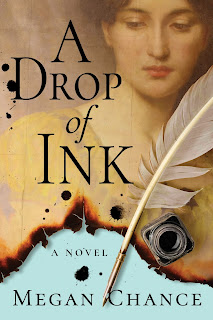This August I lost myself in Volume I of Talleyrand's Memoirs. One passage stood out and moved me to tears.
Whether are not you are familiar with the 19th century French statesman does not matter; this passage is worth knowing. It is a rare moment into the heart of the enigmatic Talleyrand who for years has baffled so many historians.
It took place in 1807. By then, as Napoleon's foreign minister, he had long been titled Prince of Benevento and gifted with the principality of Benevento, in southern Italy. He knew how to flatter and reason with the French emperor but there were limits to his influence of which the statesman was well aware.
In that year, Prussia had just been defeated by Napoleon's army. The Prince of Benevento attended deliberations at Tilsitt; these would decide the fate and treatment of fallen Prussia.
It so happens that there is another character in this story. It is Queen Louise of Prussia - that is, Louise of Mecklenburg-Strelitz.
Louise of Prussia
Queen Louise of Prussia deserves another post to herself. She was to die of a mysterious lung illness three years later, at the age of only 34. Centuries later, at the time of the Nazis, she would be revered as the epitome of all qualities that German women should aspire to. But it is 1807 and in this story, she is thirty-one years old and she is in a quandary.
Napoleon, famed for his misogyny wasted no time in alluding to the Queen of Prussia's infidelities - a gross slander given the Prussian King and Queen were very happy in their marriage. Meanwhile, Prussia faced potentially harsh economic sanctions after the war; it was up to the King to plead in favor of his country. But seeing that Louise was several months pregnant, he suggested that his wife should instead plead in favor of her people, in the hope that Napoleon, touched by this charming figure of maternity - one of the most beautiful women of the period - would soften somewhat and prove more conciliatory.
Louise hesitated. Why would she wish to appear before this emperor who had insulted her and placed public doubt on her virtue? She hoped that her husband was right. Perhaps if Napoleon saw first hand how kindly and honorable she truly was, he would retract his poor judgement of her character.
Recalling the events at Tilsitt, Talleyrand writes, "I was indignant of everything I saw and everything I heard but I was obliged to hide my indignation."
When she settled into her apartments at Tilsitt, Napoleon paid the Queen a visit. After flattering her beauty while she tried to pass on to other subjects, Napoleon turned to the King and said "How could you dare begin a war with me, I who had already conquered so many powerful nations?" The defeated King made no answer but looked upon Napoleon severely. It was Louise who replied on behalf of her husband. "Sire, it was permitted to the glory of Great Frederick II, to deceive us as to the extent of our powers; we were deceived; but it was so ordained."
Queen Louise of Prussia
by Vigée Le Brun, 1801
Talleyrand writes that Louise's usage of the word 'glory' was, in his mind, fortunately placed. He found it superb. Evidently the word was not used to the glory of Napoleon, but rather to another Prussian king from a past century. Talleyrand, never shy of using wit to taunt Napoleon, reveals that he later repeated the Queen's phrase often times, until the piqued Napoleon told him one day, "I ignore what you find so pleasing about the Queen of Prussia's words; you would do well to speak of other things." Typical.
But returning to 1807. All the efforts that Louise made to obtain concessions for her country were in vain. Napoleon remained inflexible. Losing half of her territory, Prussia was to enter many years of suffering, famine, and the state of things grew so severe that everywhere, women abandoned their children.
But it is Talleyrand's next revelation that moved me.
"I was indignant of everything I saw and everything I heard but I was obliged to hide my indignation. And so all my life, I will remain grateful that the Queen of Prussia, queen of another time, was willing to perceive this."Willing to perceive - the phrase Talleyrand chooses is so important. One can readily perceive, that is one thing. But to permit oneself to perceive is, in Talleyrand's eyes, to take a step further. If one permits oneself to see, one is willing to go against one's convictions and to combat one's prejudices (in this case, prejudices against Napoleon's foreign minister; against the vanquishing French; against the enemy etc...) For Talleyrand, to be granted this understanding was a precious thing and he felt grateful for it.
He narrates the event at Tilsitt and the sentiments they evoked, in these terms,
"If upon reflecting on my life, many passages are tedious, I recall however with great sweetness the things she had the kindness to tell me, and those she almost confided in me, "Prince of Benevento," she said, the last time I had the honor of escorting her to her carriage, "there are only two people who regret that I came here: it is me and you. You are not upset, are you, that I shall take this opinion back with me?" The tears of tenderness and pride that I had in my eyes were my only response."Louise had been unsuccessful in her quest and she knew that Napoleon would not help her country. She also still felt the emperor's insults. With those words, she admitted to Talleyrand, the French foreign minister, that she regretted having come to Tilsitt, and she confided also that she could see right through him: that he did not like what he had witnessed, and that he was filled with sorrow for her, and also wished she had not come at all.
When I read this passage, I was astounded by Talleyrand's sensitivity to having been understood. It seemed to him that this understanding, arising from another, especially in this extreme post-war moment, was a rare event, one he deemed important enough to feel grateful for.
But he felt much more than grateful. He was moved by Louise. I absolutely had to write about it and give it the attention it deserved because little or no emotion has ever been reported as having come from Talleyrand.
When trying to understand a person it is often insightful to know what it is that moves them, or brings tears to their eyes. I noted that during the entirety of Volume I, Talleyrand remains mostly unemotional. He is overwhelmingly cerebral. He displays warmth during only two instances: when he relates his relationship with the unfortunate Spanish princes sequestered at his chateau of Valençay, and when he narrates his encounter with Queen Louise of Prussia. The latter is the only time he mentions tears.
For Talleyrand, a man of mystery, a man so reserved and elusive that he would often be maligned, nothing would seem so precious than to be perceived kindly despite all appearances. For he was proud, that is certain.













































